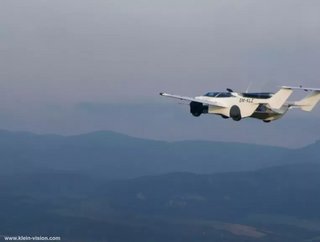Flying car completes first inter-city flight

AirCar, a dual-mode car-aircraft vehicle moved closer to production this week, fulfilling a key development milestone in a 35-minute flight from the international airport in Nitra to the international airport in Bratislava. It was AirCar’s 142nd successful landing.
After landing, the aircraft transformed into a sports car in under three minutes and was driven by its inventor, Professor Stefan Klein, and co-founder, Anton Zajac to downtown Bratislava, cutting the typical travel time by a factor of two.
The hybrid car-aircraft is equipped with a BMW engine and runs on regular petrol-pump fuel. Its creator, Prof Stefan Klein, said it could fly about 1,000km (600 miles), at a height of 8,200ft (2,500m), and had clocked up 40 hours in the air so far.
"Professor Stefan Klein is the world leader in the development of user-friendly Flying Cars." said Dr. Branko Sarh, Boeing Co. Senior Technical Fellow. "The automated transition from road vehicle into an air vehicle and vice versa, deploying/retracting wings and tail is not only the result of pioneering enthusiasm, innovative spirit and courage; it is an outcome of excellent engineering and professional knowledge," he added.
The AirCar prototypes
The AirCar Prototype 1 is equipped with a 160HP BMW engine with fixed-propeller and a ballistic parachute. Under the supervision of the Civil Aviation Authority, the AirCar has completed over 40 hours of test flights, including steep 45 degree turns and stability and maneuverability testing. AirCar Prototype 1 has flown at 8200 ft and reached a maximum cruising speed of 190km/h (103kt).
Klein is planning to build a second prototype with a new design and more powerful propulsion, which will allow a substantial increase in cruising speed. The vehicle will require an international certification from the European Aviation Safety Agency (EASA).
AirCar Prototype 2, the pre-production model, will be equipped with a 300HP engine and receive the EASA CS-23 aircraft certification with an M1 road permit. With its variable pitch propeller, the Prototype 2 is expected to have a cruise speed of 300km/h (162kt) and range of 1000km (621mi).
"This flight starts a new era of dual transportation vehicles. It opens a new category of transportation and returns the freedom originally attributed to cars back to the individual," said Professor Klein after exiting the AirCar cockpit in Bratislava.
"AirCar is no longer just a proof of concept; flying at 8,200ft at a speed of 100kt, it has turned science fiction into a reality." Added Anton Zajac, the co-founder of Klein Vision.
(Image: Klein Vision)
- Top 100 Women 2024: Robyn Denholm, Tesla - No. 8AI & Machine Learning
- Top 100 Women 2024: Safra Catz, Oracle - No. 7Digital Transformation
- Advancing AI in Retail with Pick N Pay's Leon Van NiekerkAI & Machine Learning
- OpenText’s Muhi Majzoub: Engineering Platform Growth with AIEnterprise IT






